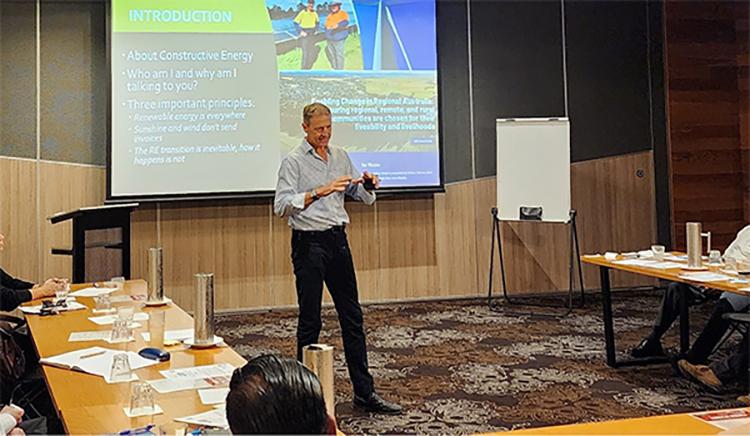By coordinating community members on the same distribution network, we can enable community energy sharing and sell surplus energy to retailers, allowing everyone to profit from their contributions. Together, we can keep energy local, ease pressure on the grid and deliver benefits to the community.
"Keep Energy Local"—that was the vision of the Regional Energy Transition Collaborative (RETC) project, delivered by Regional Development Australia Ipswich & West Moreton (RDAIWM) with funding from the Queensland Government's Advance Queensland initiative. The project investigated how collective action through modern technology and innovative energy sharing models can transform the local distribution network and create significant economic benefit.
Focusing on the Ipswich and West Moreton region, RETC evaluated three cohort-based models—imaginatively titled 'small' (residential), 'medium' (residential plus SMEs and small commercial), and 'large' (commercial and institutional)—to determine their technical viability, social readiness, and economic impact.
RDAIWM collaborated with CS Energy to gain insights into the large-scale model and received guidance from the Queensland Department of State Development, Infrastructure and Planning, SEQ West Regional Office. Additionally, RDAIWM partnered with energy consultant Ashley Bland from Constructive Energy to provide the technical expertise needed for comprehensive energy data analysis and reporting across the three proposed models. RDAIWM led community engagement, seeking to understand the community drivers for each model and uncover insights.
The project's final report shows that coordinated energy sharing can materially relieve network constraints and flatten peak demand—with far fewer participants needed to achieve meaningful outcomes for the medium and large-scale models. The final report also highlights the importance of local coordination to navigate the complexity of energy sharing.

Image: Ashley Bland presenting at the Regional Energy Transition Collaborative Forum
Over the 12-month duration of the project, there were many learnings. Here are just three things we know for sure.
1. The power of the right people
On the journey of our renewable energy project, we discovered a fundamental truth: the right partners make all the difference. Not revolutionary, but there you go.
At the outset, RDAIWM took a leap of faith, believing in the potential of energy sharing for our region. We collaborated with trusted allies, secured a vital grant, and set our plans in motion. But as we began to navigate the intricate details, a reality emerged—not all of our priorities and visions were aligned.
This led us down some tricky paths: navigating difficult conversations, negotiating different understandings, dealing with contract law—all while trying to propel the project forward. The lesson is clear: selecting partners who genuinely care for your region and its people is crucial to place-based projects' success.
2. Requesting people's energy data can be seen as espionage
Asking businesses, residents, and organisations to provide energy data and actually get it was no mean feat. Obtaining enough energy data was crucial to the project, as it enabled the number crunching needed to prove the models.
Now we can tell you that asking for energy data (or any data) from residents, businesses, and organisations is difficult in this day and age. Without realising it, we were asking people to give up a certain amount of privacy and make themselves or their organisations vulnerable.
It was only because of our trusted local relationships that RDAIWM could make headway. Leveraging our community networks and relationships was the golden ticket. The project secured enough data for the number crunching to be crunched and the models to be proven. The lesson: Enriching the region and building strong relationships across the community means RDAIWM is a trusted part of our community.
3. It all comes down to time
What's that old saying about time? Well…there are many, most of which are relevant to the RETC project. With 12 months to prove a theory and deliver agreed outcomes, every moment was crucial. In a 'new to you' industry, understanding jargon, policies, regulatory layers and the concepts takes time. Getting the community to engage and be interested takes time, and effort.
One thing we now know to be true: Renewable energy is a minefield, and communities are confused, fatigued and often angered by it. How do you listen to feedback and build an energy share model that people want to participate in if the subject feels off-limits? Our goal to be community-led and insights-driven was challenging. Delivering social media content to build website traffic was insufficient in a sea of solar deals and renewable energy hard sells.
The RETC persisted, and over time, we realised no amount of clever marketing or social media posts would get locals to engage, feel at ease, and believe we weren't selling something. A more personal approach was needed—we found through one-on-one conversations people are more inclined to take an interest, talk, and listen to the power of energy sharing and how it could change how we consume energy.
In the end
RDAIWM are proud to say that after 12 months of unwavering dedication to our first renewable energy project, we made it. We made it work, we have proven (remember those brilliantly named small, medium and large models?) our theory, that energy sharing for the greater good of the community and the energy grid is a promising reality in our region.
Our research has paved the way for an energy share trial, which will see RDAIWM seek funding to conduct further qualitative research and secure organisations in our region's booming industrial sector to trial energy sharing on a large scale.
As we leverage the RETC project outcomes to tell compelling stories and share impressive facts that put us at the table for further funding opportunities, we've begun to reflect on our journey so far and why it's essential to keep fighting for the next phase of our project.
RDAIWM strongly believes energy sharing empowers communities to collaborate and harness local resources, reduce costs and share in the benefits. We are continuing to work hard to "Keep Energy Local".
Want to know more? Reach out to us at www.rdaiwm.org.au.
Note: Case study current as at 23 October 2025.